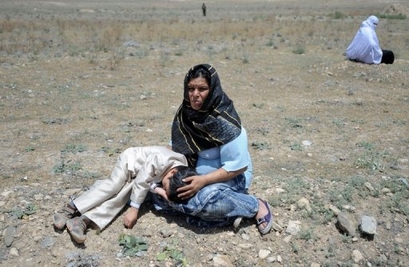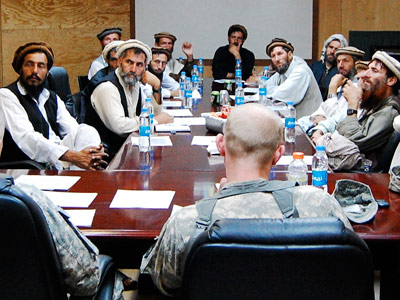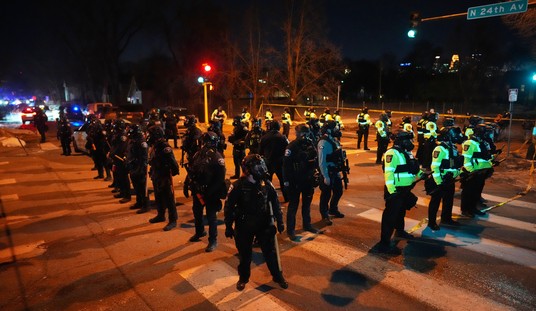
America’s muddle in Afghanistan is not merely an unwise policy. Two prominent American authors — one a serious analyst (and former badass warrior), the other a bestselling novelist (who created one of our biggest badass heroes) — worry that it is an affront to American manhood as well.
For years Bing West has argued that our carrot with no stick approach to counterinsurgency and nation building in Afghanistan is sapping the “martial spirit” of our armed forces. Recently, he even wrote a column titled “We’re Too Nice to Win in Afghanistan,” detailing how a wimpy approach to a truly savage enemy is making victory impossible.
West proposes we change from a counterinsurgency protocol (winning hearts and minds in order to recruit allies against the terrorists while building a civil society) to a counter-terror strategy (kill them whenever and wherever we can find them and let the Afghan government build its own society).
Vince Flynn, in his new book The Last Man, has his fictional alter ego, Mitch Rapp, take a very direct approach. Upon being introduced to a former Taliban official the CIA has recruited to be part of the Afghan security infrastructure as America prepares to leave the country, and who is certainly playing both sides, he sees only one incentive structure that can work:
Pistol-whip the sneaky bastard and threaten to kill him if he doesn’t cooperate.
So, based on West’s superb book on the war in Afghanistan, The Wrong War, and Flynn’s best thriller to date, here are 5 ways that Obama’s approach to Afghanistan is an affront to American manhood.

5. Sets a Date Certain to Give Up
From the time Americans males are little boys — at least for those who have real men for fathers — we are instructed in the virtues of perseverance. Sports gives a prime example. NFL coaches stress “playing for 60 minutes,” and NBA coaches for 48.
Winning is about how you finish, not how you start. Just ask Admiral Yamamoto.
Now George W. Bush had his problems with how he conducted the war, adopting a counterinsurgency strategy of nation-building; but he drew the line at drawing this line. You don’t tell the enemy “Just hold out until 2014, and we will be out of your hair.”
Even if you think that nation-building is good, and merely letting SEALs, Delta, and the like play whack-a-mole with the bad guys to their hearts’ content is insufficient, this is just plain stupid. Telling the people whose support you need that you are outta here soon, but the enemy will stay forever, is not exactly what an economist would call a good incentive.
Mitch Rapp adds that incentive through pistol whipping.
Bing West explained in a Wall Street Journal column last October that the deadline loomed over everything the Marines he was with were trying to accomplish:
Joint patrols cannot substitute for Afghan troops who must believe in their own cause. Nothing is gained by “jointness” if the Afghan forces are getting ready to cut local deals and pull back as we leave.
It will just be great for morale, and for recruiting soldiers with a warrior spirit, if the greatest military the world has ever seen is just admitting they are tired, even though they are not being beaten on the battlefield.

4. It Doesn’t Inflict Justice on the Guilty
In The Wrong War, West uses a history of modern guerrilla warfare and counter-insurgency to point out that the United States is trying to do something that has never been done before anywhere in how it is trying to bring civilization to Afghanistan, rather than merely punishing the enemy:
Following the First World War, Winston Churchill, then secretary of state for the colonies, approved of summary executions of Irish insurgents in retaliation for the deaths of British soldiers occupying southern Ireland. The foremost scholar on counterinsurgency, David Galula, described his experience as a French officer in the Algerian War in the 1950s in these terms: “We searched the suspect’s house thoroughly and found the missing shotgun. I phoned my battalion commander and asked him if he agreed that the man should be shot on the spot. He did. The harkis executed him.” On another occasion, Galula threatened to bake a man in an oven. The man co-operated.
During the Second World War — the “good war”— the esteemed journalist Eric Sevareid stood by as U.S. soldiers shot German troops and Italian civilians. “As the weeks went by and this experience was repeated many times,” Sevareid wrote, “I ceased even to be surprised.” In his book Citizen Soldiers, the historian Stephen Ambrose devoted a chapter to prisoners of war, citing numerous instances when American soldiers shot prisoners. The press never reported one instance.
In The Village, a chronicle of my Combined Action Platoon in Vietnam, I wrote, “The Marines watched as Thanh beat his prisoners. When one woman refused to talk, he rubbed a wet cloth with lye soap and pressed it against her face. The woman struggled to breathe and sucked into her throat the stinging lye.”
Such stories had no effect at the time they were written; in 2011, they would all be sensations to the press. Today, the U.S. Congress would not tolerate deportation, sanction a $500-million bribe, approve of retaliatory executions, or ration food. Galula would be portrayed as a war criminal. Sevareid, the face of CBS, would be excoriated for not reporting the killings of prisoners, as would I for complicity in waterboarding.
Afghanistan was singularly different from any prior insurgency. Far from employing sticks of coercion of any sort, the Western coalition offered only aid and sympathy to hostile villagers. The United States possessed precision firepower, with sensors that tracked any individual out of doors. Yet in 2010, less than 5% of aircraft sorties dropped a single bomb, despite over 100 reports of troops in contact daily. This forbearance was without historical precedent. The coalition imposed upon itself the strictest rules in the history of insurgent warfare.
Forget the hoary clichés about the British and the Russians failing to rule Afghanistan. Afghanis (whatever they are) have never ruled the region named Afghanistan — basically a border drawn around the leftovers as the British Empire contracted.
3. It Doesn’t Protect the Innocent
The first manly virtue is to protect the weak. Women and children first may be considered chauvinistic in some circles, but… good. Who cares about those circles, anyway? More from West in The Wrong War :
However, coalition and Afghan rules covering crime and punishment lacked purpose, consistency and reliability. A few kilometres south of Jakar, an 11-year-old boy often waved at passing patrols. The Marines took to chatting with the boy, who pointed out a trail the Taliban occasionally used. A few weeks later, the Taliban executed him and his brothers, sisters, mother and father. Although shocked neighbours knew the identities of the gang that had gone to the farm in the middle of the day, no one would testify.
The tragedy illustrated a disquieting truth: American military doctrine didn’t know how to confront evil. On the one hand, the Taliban were portrayed as extremists who stoned women to death, burned schools and whipped men. On the other hand, the generals indicated that most Taliban were misguided youths.
“In the Taliban ranks,” Gen. Stanley McChrystal said, “there’s a tremendous number of fighters and commanders who would like to come back in.” Among the fighters who might come back in were the local Taliban farm boys who murdered the 11-year-old and his family. The American military and judicial systems were so tied up in political knots that in Afghanistan there were no coalition trials for murderers or terrorists. If they renounced the insurgency, the coalition would give them jobs.
Worse, Afghans as a society denied that fellow Afghans were capable of evil. The locals knew the killers. But there was no penalty for murder if committed in the name of Islam.
(By the way, the above quote is worth considering before conservatives like Sean Hannity put McChrystal on a pedestal just because he is critical of Obama.)
Our only concern for the innocents in Afghanistan seems to be the politically motivated desire to avoid collateral civilian deaths. But by instituting the most restrictive rules of engagement since Vietnam, we have given the Taliban and al-Qaeda incentive to use human shields.
And by making American soldiers, Marines, and airmen stand around and let this happen, we murder their martial spirit, and ask them to be less than the men they are.

2. It Spoils Them Rotten
As West spells out in frustrating detail, the nation-building policies of the last two administrations have made welfare clients rather than allies out of Pakistani villages. Even if you think that counterinsurgency programs rather than counterterrorist missions are a wise policy, all carrot and no stick is doomed to fail.
Thus, our military became a gigantic Peace Corps, holding millions of shuras, drinking billions of cups of tea, and handing out billions of dollars for projects. Risk in battle was avoided because generals proclaimed that killing the enemy could not win the war. Senior officials fantasized that the war would be won by protecting and winning over the population. The tribes however, were determined to remain neutral, while the Afghan president tolerated corruption and ineffectiveness. The futile effort to build a democracy diverted the energies of our soldiers and weakened their martial spirit.
For years, Pakistan was in the hunting-bin-Laden business, to the tune of $2 billion a year. If they actually had “found him” it would have been nice publicity, but that would have ended that particular gravy train.
Of course, as Flynn details in The Last Man, the ISI, the Pakistani intelligence agency, was neck deep with bin Laden from the beginning — and the location of his ultimate hiding place only adds to the suspicion that that association did not end after 9/11.
Our policy now is of continuous handouts to tribal leaders whose hands are constantly out, but who will do nothing to help us against the Taliban because they know there is a date certain where we will be gone and they will be on their own. All the while we do nothing to make them regret coddling the terrorists.
1. It Requires Negotiation Where a Good Pistol Whipping Would Do
Mitch Rapp to the rescue!
Vince Flynn’s latest Mitch Rapp novel is about a rescue mission in Afghanistan, but it’s also a mission of mercy to thriller readers at the end of a tepid year for red-blooded American heroes.
In fact, from the summer on, I’m not sure I can think of two adult-oriented suspense novels I enjoyed as much as PJM contributor Andrew Klavan’s two “young adult” actioners in 2012.
But while Flynn targets action-starved readers with his latest book, he also targets the Obama administration’s policy of reintegration, re: not only granting amnesty to former Taliban members, but making them members of the security forces in Afghanistan.
Flynn does a nice job of detailing what is wrong with the policy and its various dangers and complications — but his hero Mitch Rapp registers his disgust minutes after landing on the ground, without needing all that.
In fact, pretty much the first thing Rapp does when he lands in Kabul on a rescue mission is to pistol whip a former Taliban official that CIA officers have recruited.
As any real American man would like to.
The Last Man is not only one of the year’s best thrillers, it’s also Vince Flynn’s most politically sophisticated work to date. The plot — while it features Mitch Rapp’s signature methods as the Dirty Harry of international espionage — has the currency, and nearly the complexity, of an Alex Berenson novel.
The Last Man plunges Mitch Rapp into America’s current exercise in nation-building in Afghanistan — a situation so muddled and confused that even our favorite bull-in-the-china-shop hero can stop and smell the ambiguity.
Joe Rickman, the head of CIA clandestine operations in Afghanistan, has been kidnapped in a bloody raid on his quarters in Pakistan, and presumably spirited across the porous border into a Taliban camp. For Irene Kennedy, concerns are two-fold. First, Rickman is one of those operators whose every move and contact are not necessarily known to his superiors, and he knows everything the Agency is doing in Afghanistan… and should be doing.
Second, she remembers all too well the Hezbollah capture of William Buckley, the Beirut station chief in the 1980s, and the damage done to networks in the Middle East — but also the regular taunting videos of his torture sent to Langley by the terrorist group.
Mitch Rapp is sent to Kabul with his favorite kind of orders — get the job done at any cost. Rickman is important enough that even the delicate balancing act of the “alliance” with Pakistan takes a back seat.
Pakistani officials, after the embarrassment of the Osama bin Laden raid, are not only suspicious of American operatives inside their borders but of each other. Adding to Rapp’s headaches — and outrage — is the fact that the CIA station chief and his top aide are heavily investing in the policy of “reintegration,” the policy of recruiting former Taliban into the Afghan police and security forces.
Rapp promptly pistol whips a corrupt former Taliban and current police commander into working for him under the threat of death—drawing the ire of the CIA officials on scene.
But his impatience at what he considers the wimpy policy of coddling enemies really takes a beating when Rapp is forced to accept the help of the assassin who killed his wife.
Meanwhile, Rapp is not so convinced that Rickman’s disappearance is merely a Taliban operation. A coordinated attack on the clandestine division—including evidence going to the FBI, and egged on by a liberal senator that implicates Rapp in the theft of millions in black bag mission money—smacks of state involvement more reminiscent of a Cold War-class operation than of something the Taliban or even the Pakistanis could pull off.
But the title also refers to the attempt by liberals to weed real men out of the CIA. The ultimate bad guy of the book (a twist I can’t reveal here) is not merely afraid of Rapp because he is talented, smart, or dangerous. It is he who dubs Rapp “the last man” at the CIA.
What the villain fears most about Rapp is that while all the other bureaucrats around him are caught up in the weeds of their complicated calculations and alliances, Rapp’s all-American sensibilities will be offended enough that his B.S. detector will cut through the policy he despises and straight to the real solution.
Through Rapp, Flynn continuously expresses manly contempt for the various schemes the United States has concocted in Afghanistan in order to conduct the war in a way that is acceptable to wimpy modern sensibilities. He fully adopts Bing West’s point in The Wrong War that America has bought temporary allies with our largess, but that the bad guys we don’t kill are a permanent fixture, just waiting for us to leave.
Flynn is contemptuous of the notion that complicated is always smarter than simple and that believing in shades of gray in the name of pragmatism is successful. Some ideas really are so absurd that only “smart” people can convince themselves they will work. Evil is evil, and it can only be defeated or accommodated in the long run. It is never bought off.
The Last Man is a welcome return to the present day for Mitch Rapp, after a couple of so-so origin stories from Flynn.
Now if only a foreign policy worthy of the American males who do the fighting and dying for it would return, also.
*****
image courtesy shutterstock / Aaron Amat
Previously at PJ Lifestyle from Dave Forsmark:
Allah, Odin, and Thor: Mythical Gods of War, Not of Love
Race, Revolution, and Robespierre
The 7 Most Badass Founding Fathers
A Firsthand Account of the Most Extraordinary Battle in the Afghan War
More on Masculinity at PJ Lifestyle:










Join the conversation as a VIP Member